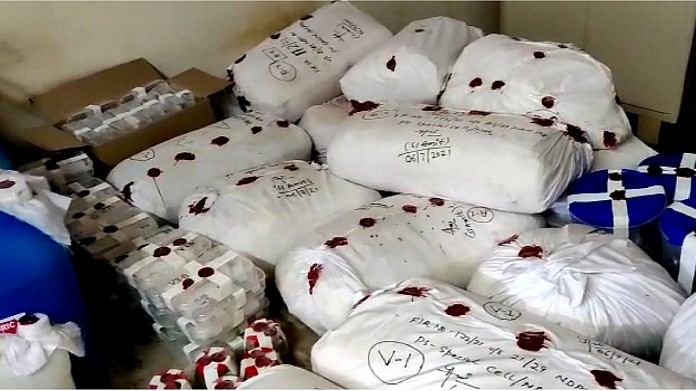New Delhi: The kingpin of a drug cartel peddling high-quality heroin across India — an operation worth thousands of crores of rupees — is believed to be based in Afghanistan and could possibly be backed by the Taliban, ThePrint has learnt.
The drug racket is believed to be controlled from Afghanistan, from where it is sold to dealers based in Portugal, who then use sea routes — usually via Iran — to smuggle the narcotics into India, sources in the Delhi Police told ThePrint. Once the contraband reaches India, the sources said, a large network of peddlers markets the drug in various states.
“The entire operation is controlled in Afghanistan, where opium is grown. We suspect this cartel is backed by Taliban and Islamic State as it is first sent to Iran and then to India. However, we are yet to completely ascertain the narco-terrorism angle. Our agencies are working to get more information,” a senior police officer said.
On Saturday, the Special Cell of the Delhi Police seized its largest ever haul of the drug — 354 kg of Afghan heroin worth more than Rs 2,500 crore — from a house in Faridabad. Four persons, including an Afghan national, have been arrested in the case so far.
According to the police, drugs from this supply chain were being sold in Punjab, Delhi, Haryana, Rajasthan and Jammu & Kashmir among other parts of the country.
Police investigations revealed that the heroin would be concealed in legitimate exports — talc stone, gypsum powder, basil seeds and in other packaging materials like gunny bags, cartons — and then smuggled through Iran’s Chabahar port into Mumbai via the Jawaharlal Nehru port. From here, the consignments were being transported to Shivpuri in Madhya Pradesh where the drugs were being extracted and processed before being peddled, the police sources said.
Also read: Rich, wealth-flashing drug peddlers NCB is looking for. They are the ‘pandemic brats’
2019 heroin bust puts police on drug trail
In a multi-state operation, the police had seized 330 kg heroin worth over Rs 1,320 crore, allegedly running under directions from an Afghan drug lord, Haji, in July 2019. The Delhi Police Special Cell had been collecting intelligence on the drug cartel ever since, and the latest bust was a result of this.
The sources told ThePrint that the same route used in 2019 to transport drugs into the country was used now. The cartels have also grown larger in terms of network, and more careful, after the 2019 bust — when 130 kg was seized from Navi Mumbai Customs Bonded Warehouse and 200 kg was confiscated from four Afghan nationals in a house in Delhi’s Zakir Nagar, the sources added.
The police suspect that the heroin seized in Faridabad is from the same cartel, given the similarities in the modus operandi.
“They used the same route last time. The modus operandi was similar — Afghanistan to Iran and then to Mumbai, after which it was sent to reconstitution factories in Delhi and Punjab. Last time, it was transported as a basil seed consignment,” said the police officer quoted above.
“After the loss suffered last time, the cartel has become extremely cautious and stays off Delhi limits. Moreover, they have shifted the processing factory to Shivpuri, Madhya Pradesh. This is because Shivpuri is located close to the national highway and makes it easier to peddle the drugs via land routes across states in the country,” the officer added.
Also read: Heroin worth Rs 1,000 cr, mid-sea ops — how NCB unearthed Pakistan, Sri Lanka-based syndicate
Highway factories, dhaba distribution points
Shivpuri, according to the Delhi Police, serves as a central point for both transportation and setting up of makeshift factories to extract the drug.
“The factories in Shivpuri are completely makeshift and they keep changing locations. Moreover, the extraction process doesn’t require heavy machinery, only some chemicals like hydrochloric acid etc, which they procured through local contacts in chemical shops across Madhya Pradesh,” the officer quoted above said.
While the scale of the narcotics operation appears big, the officer said it is difficult for them to fully ascertain just how wide it is, since most of the people working in these networks are unemployed youth doing odd jobs, and the chain of command is highly secretive and undergoes continuous change.
“The peddlers aren’t regular, they keep changing for various spots. Moreover, this time, they have bought second (hand) cars in the names of some of these peddlers or transporters, who also have other side businesses, and don’t use stolen cars. Most of those selling the heroin don’t know the chain of command themselves,” the officer added.
He explained: “The communication between different parties is extremely limited. The drug is picked up from the factory by two to three individuals, the transporter is already sitting with his car parked in a highway-side dhaba. One individual comes by and checks if there is anyone else with the transporter. They receive strict instructions to come alone. Upon confirmation, the drug is then loaded into the car and the transporter then leaves with it.”
What makes the task to trace the kingpins most difficult is the fact that “none of these people involved know each other”.
(Edited by Manasa Mohan)
Also read: Fish are getting addicted to meth as illegal drugs pollute water bodies, study finds



